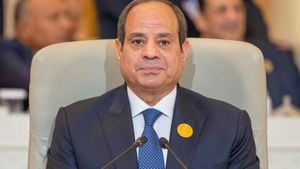Thailand faces mounting pressure to adjust its monetary policy as the government intensifies its push for reductions to the interest rate. Analysts and officials alike are closely watching the Bank of Thailand (BOT) as the institution prepares for its monetary policy meeting set for February 26, 2023. The hope is for decisive action to stimulate the economy, with the government advocating for interest rate cuts to help manage inflation and invigorate growth.
Recent reports indicate the Thai economy has been struggling, with consumer confidence and investment levels lagging behind expectations. Inflation rates have remained comparatively low; as of now, the country is focused on keeping inflation within the desired target range of 1-3%. The Cabinet's expectations communicated directly to the BOT suggest urgency for changes to financial policy as they seek to revitalize the economy.
The Ministry of Finance's undersecretary, Peerapat Rojsakul, articulated the government’s view on the interdependence of monetary and fiscal policies, stating, "We need to coordinate the efforts of both sectors to effectively stimulate Thailand's economy for recovery and growth." This statement reflects the government's broader strategy to align monetary policy adjustments with fiscal measures to spur economic activity.
The government's approach includes cash transfer initiatives aimed at vulnerable segments of society, with plans to distribute 10,000 THB per individual. These programs are expected to bolster consumption, but the impacts are yet to be fully seen. Data suggests the consumer spending has reportedly plateaued, with growth nearing only 3.4% year-over-year leading up to the new fiscal period, hinting at underlying sluggishness within the broader economy.
Further financial projects were also outlined, including tax reductions aimed at stimulating spending, but there are concerns from economic analysts like those from the National Economic and Social Development Council (NESDC) over the limited overall effectiveness of these measures. Many point to this as evidence of the need for revisiting interest rates holistically.
With corporate bank loans seeing their first decline in 15 years, the BOT is under increasing scrutiny. Reports highlight how the banking system's credit shrinkage is indicative of broader hesitation among private investors to increase spending and investment under current conditions. Such dynamics raise questions about the BOT's previous decisions on interest rates and whether the current rates can continue to support economic recovery or need adjustments.
On the same day of the Cabinet's recommendations, news surfaced from various financial institutions indicating the significance of the BOT's upcoming decisions. Economic analysts noted, "Adjustments at this stage could significantly impact the banks' capability to lend more freely, providing the necessary fuel for economic activity.”
Despite the warnings, there are scholarly voices advocating for caution. Some recommend the BOT hold off on aggressive cuts, indicating it might be wiser to reserve monetary ammunition for potential future economic shifts described by global economic analysts.
While the BOT looks to balance its strategies, market watchers note the dynamic between economic needs and fiscal health remains precarious. Observers expect the Bank may soon favor lowering the benchmark interest rate from the current level of 2% as part of broader financial strategies intended to support the economy’s recuperation phase.
With the political climate also promising shifts, marked by new leadership under Prime Minister Srettha Thavisin - with expectations of fostering more proactive measures - subsequent monetary decisions promise to be pivotal. The Cabinet's recent correspondence to the BOT signifies not just wishes for interest reductions but also reflects the evolved economic narrative where the restoration of confidence, consumption, and investment stands at the forefront.
Looking forward, continuing these synchronized approaches will be fundamental. The effective coordination of fiscal attention and interest rate policies could enable Thailand to navigate the choppy waters of post-pandemic recovery, adapting to both domestic and international pressures shaping economic growth trajectories.



